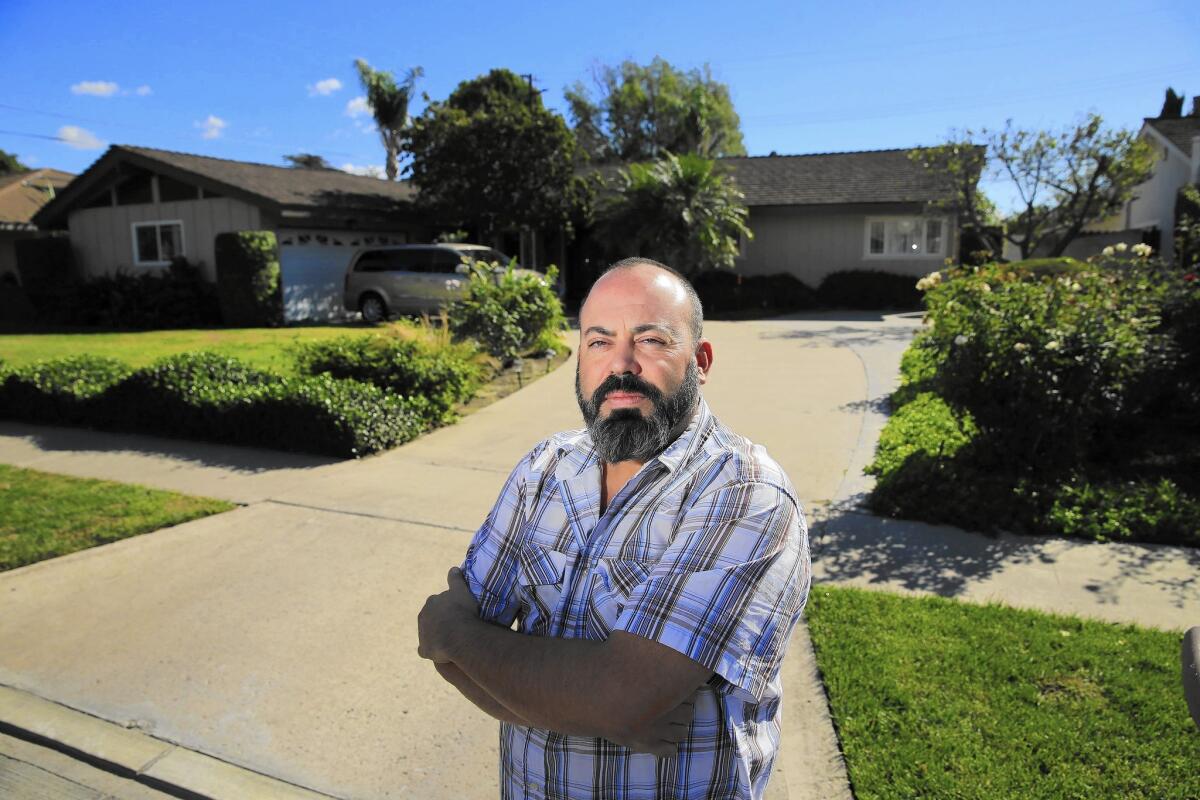A surge in short-term rentals means no R&R for some Anaheim residents

Fred Cornejo of Anaheim stands in front of one of seven homes near his that were converted to short-term rentals. They are “totally destroying the neighborhood,” he says.
Ten years after moving into a quiet Anaheim neighborhood to raise his five boys, Fred Cornejo is thinking about leaving.
Because of the Disneyland resort, seven nearby houses, including the house across the street, have been converted recently to short-term rentals, booked through online sites such as Airbnb, VRBO and HomeAway.
Some have bunk beds and converted garages to pack in large groups. Late-night parties, loud music and traffic are routine on his tree-lined block.
“It’s totally destroying the neighborhood,” Cornejo said.
Anaheim thrives on tourism. But now city officials must respond to frustrated homeowners while trying to oblige rental owners — a new tax source — who host visitors to Anaheim’s biggest tax-generator and employer: Disneyland.
“We are trying to strike a balance,” city spokeswoman Ruth Ruiz said.
The Anaheim City Council adopted a moratorium on short-term rental permits this fall to give its staff time to research new regulations.
Tourist-heavy towns including Santa Monica, Los Angeles and San Francisco are grappling with similar issues. San Francisco voters recently rejected a ballot measure to impose tough restrictions on short-term rentals.
In Anaheim, short-term rentals raise new problems for a city that long tried to maintain a peaceful coexistence between residents and the theme park.
By the time Anaheim adopted its temporary moratorium in September, it had already approved 221 permits for short-term rentals and was in the process of reviewing 182 additional applications. Although Anaheim is home to 150 hotels with nearly 20,000 rooms, the city was receiving five to 10 applications a week to operate new rentals.
“It’s a hot industry,” said Charlie Ryan, head of sales for Pillow, a San Francisco vacation rental management company. “There are a lot of people trying to make money off of it.”
Compared with other nearby tourist hubs, Anaheim has a particularly dense concentration of short-term rentals in a small area near Disneyland.
Residents say family neighborhoods are teeming with tourists crowding the curbs with parked cars. On a few blocks, short-term rentals nearly outnumber owner-occupied homes.
In the Sherwood Village townhouse development, about a block from the Anaheim Convention Center and less than two miles from Disneyland, 50 of the 221 units have city permits to operate as short-term rentals, according to city data.
“I bought a condo here with the premise that it was going to be a residential community, not a resort,” said town home owner Luisa Lam, who complains that renters take over the pool and overflow the trash bins.
More than 40% of the homes that have permits to rent in Anaheim are owned by real estate companies, investment firms or the owners of multiple properties, according to city records.
“These are basically unsupervised mini hotels in our neighborhoods,” said Cornejo, who has called the police on his neighbors several times for late-night noise.
With so many strangers visiting their communities, some residents recently urged Anaheim council members to consider safety and security issues. Renter safety too has become a growing concern in the wake of some well-publicized reports of sexual assault, injuries and deaths at short-term lodgings in other towns.
The surge in applications to operate short-term rentals in Anaheim began soon after the city adopted rental regulations in 2014.
A short-term rental in Anaheim must pay an annual $250 registration fee and a 15% room tax, which generates $200,000 to $300,000 a month for the city government, officials said.
Anaheim’s regulations don’t restrict the number of rentals allowed in a designated area or limit the number of days a home may be rented each month.
In Hermosa Beach, Huntington Beach and Dana Point, short-term rentals aren’t allowed in residential areas.
In the San Luis Obispo County town of Cambria, short-term rentals can’t open within 200 feet of an existing short-term rental. In San Francisco, a property owner who doesn’t live in a home can rent it out for a maximum of 90 days a year.
Anaheim is now considering whether to adopt similar restrictions.
But if Anaheim rules become too onerous, the city could drive the short-term rental market underground and lose out on its tax revenue, property managers say.
Matt Curtis, a spokesman for the online booking site HomeAway, gave the example of Palm Desert.
The popular Riverside County retreat for “snowbirds” imposed tough regulations for short-term rentals, requiring a temporary use permit and a $500 annual fee, plus a 9% transient occupancy tax.
But the city’s planning staff determined through an online search that several hundred short-term rentals were operating without permits. In 2012, the city relaxed its rules, charging instead a $25 annual fee plus the transient occupancy tax.
“The market demand is so strong that people will find a way to do it, one way or another,” Curtis said.
For homeowners, strong demand means big profits.
In Hermosa Beach, a two-bedroom home can generate an average of $6,530 a month, according to Pillow.
In Anaheim, revenues could be much higher.
Across the street from Cornejo, a four-bedroom, 2 1/2-bath ranch-style house is advertised on HomeAway as accommodating 10 people and costing an average of $325 a night.
SIGN UP for the free California Inc. business newsletter >>
Several Anaheim homeowners say real estate companies have offered to buy their homes to convert into short-term rentals for as much as 125% of the market value. Home values in Anaheim are up 5.8% over last year, while values for homes throughout Orange County increased only 1.4% in the same period, according to the real estate website Zillow.com.
Big homes are in demand in Anaheim.
On West Skywood Circle, a six-bedroom home about six miles from Disneyland rents for an average of $617 a night. Under city code, the home can accommodate no more than 20 people. But in a recent online review, a tenant bragged about squeezing 34 people into the home.
“We thoroughly enjoyed our stay in this gorgeous home,” the reviewer said.
Anaheim has adopted fines for short-term rental operators of $200 for the first offense, $400 for a second and $1,000 for a third violation within a 12-month period. Since the program began in 2014, Anaheim has collected $13,600 in fines against 21 properties.
Sandra Sagert, who heads Anaheim’s code enforcement unit, said noise complaints and other problems have grown with the surge of short-term rentals in the city.
“In the last two years, it’s just been booming,” she said.
Cornejo remembers his first visit to the area — a Fourth of July block party on West Tonia Lane. He said he saw that all the neighbors knew each other, crime wasn’t a problem and children could walk to a nearby park and elementary school.
“I told my wife, ‘This is where I want to live,’” said Cornejo, the owner of an insurance and finance company.
Recently, he said he was contacted by a real estate company offering to buy his home. The offer is tempting, he said, but Cornejo hopes new regulations will fix the problems in Anaheim.
“If every home that sells is converted,” he said, “we won’t have a neighborhood.”
Twitter: @hugomartin
ALSO
Disney’s Bob Iger hired by Chargers, Raiders to oversee Carson stadium project
Why the success of the $15 minimum wage movement has surprised its leaders
Newport Beach ordinance will ban marijuana growing and sales
More to Read
Inside the business of entertainment
The Wide Shot brings you news, analysis and insights on everything from streaming wars to production — and what it all means for the future.
You may occasionally receive promotional content from the Los Angeles Times.











